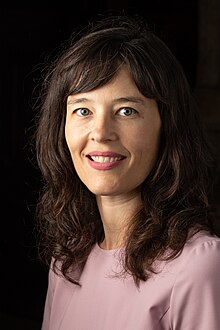Megan Twohey | |
|---|---|
 Twohey at the 2018 Pulitzer Prizes | |
| Born | Evanston, Illinois, U.S. |
| Alma mater | Georgetown University |
| Occupation | Journalist |
| Awards | 2018 Pulitzer Prize for Public Service (named contributor) |
Megan Twohey (/ˈtuːi/ TOO-ee)[1] is an American journalist with The New York Times. She has written investigative reports for Reuters, the Chicago Tribune, and the Milwaukee Journal Sentinel.[2] Twohey's investigative reports have exposed exploitative doctors, revealed untested rape kits, and uncovered a secret underground network of abandoned unwanted adopted children.[3] Her investigative reports have led to criminal convictions and helped prompt new laws aimed at protecting vulnerable people and children.[4]
On October 5, 2017, Twohey and fellow New York Times journalist Jodi Kantor published a report about Harvey Weinstein detailing decades of sexual abuse allegations, and more than 80 women publicly accused Weinstein of sexually abusing or assaulting them.[5] This led to Weinstein's firing and helped to ignite the viral #MeToo movement started by the American activist Tarana Burke.[5][6] That work was honored in 2018, when The New York Times was awarded the 2018 Pulitzer Prize for Public Service.[7] Kantor and Twohey won the George Polk award and were named to Time magazine's list of 100 most influential people of the year. Twohey and Kantor subsequently authored a book which chronicled their report about Weinstein, titled She Said. The book was published in 2019, and adapted into a film of the same name in 2022. In addition to winning the 2018 Pulitzer Prize for Public Service, Twohey was a finalist for the Pulitzer Prize for Investigative Reporting in 2014.[2][8]
- ^ Twohey, Megan (September 15, 2020). "A Deadly Tinderbox". The Daily (Podcast). The New York Times. Event occurs at 0:00. Retrieved October 4, 2022.
- ^ a b "Megan Twohey". The New York Times. January 12, 2018. ISSN 0362-4331. Archived from the original on January 17, 2018. Retrieved January 17, 2018.
- ^ GmbH, finanzen.net. "CJF to present Special Citation to New York Times reporters who broke Harvey Weinstein story". markets.businessinsider.com. Archived from the original on January 19, 2018. Retrieved January 18, 2018.
- ^ Cite error: The named reference
:2was invoked but never defined (see the help page). - ^ a b "NYT reporters on breaking Harvey Weinstein story, #MeToo "reckoning"". NBC News. December 19, 2017. Archived from the original on January 18, 2018. Retrieved January 17, 2018.
- ^ Kantor, Jodi; Twohey, Megan (October 5, 2017). "Harvey Weinstein Paid Off Sexual Harassment Accusers for Decades". The New York Times. ISSN 0362-4331. Archived from the original on August 24, 2021. Retrieved January 18, 2018.
- ^ LaForme, Ren (April 16, 2018). "Here are the winners of the 2018 Pulitzer Prizes". Poynter. Archived from the original on August 10, 2018. Retrieved April 16, 2018.
- ^ Cite error: The named reference
:3was invoked but never defined (see the help page).